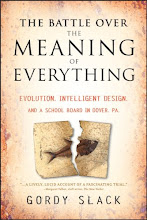 |
| WATSON |
And it's true. The humans were amazing.
In his Slate piece, Jennings writes that "the computer's techniques for unraveling Jeopardy! clues sounded just like mine.... I felt convinced that under the hood my brain was doing more or less the same thing." Well, while there are some engineers at IBM who have a pretty good idea what was going on under Watson's hood, nobody could give you a very good account of what was happening under Jennings's brainpan.
Marvin Minsky at MIT says he'll be able to tell us how big a milestone Watson's victory is when he sees the papers (if IBM publishes them) describing the algorithms behind the digital player. But the paper I want to see is the one describing Ken Jennings's algorithms. Watson's processors occupy ten refrigerator-sized units in the IBM HQ and require their own power plant to run. Jennings's processors are folded neatly into a seamless three-pound assemblage of cells that will run for 90 years on veges and water.
Let's go neuroscience, tell us how Jennings does it! At this rate, we'll have a hi-fi facsimile of human intelligence long before we know the basics of how the real thing works.


2 comments:
I agree, the question I had, after watching the game, was not about Watson, but about Ken. That guy is fast! Whatever is going on in his brain is not happening in mine. But, when asked the explain the difference between Watson's computing ability and Ken's, scientists can only comment on the IBM prodigy. "We don't understand enough about how the human brain computes," one of them said. It seems we still have a mystery for science to unravel!
Brains are better than computers, there's no question about it. And Ken's is a special one: very fast, and funny, too. In his Slate piece he writes that “Watson has lots in common with a top-ranked human Jeopardy! player: It’s very smart, very fast, speaks in an uneven monotone, and has never known the touch of a woman.”
Post a Comment